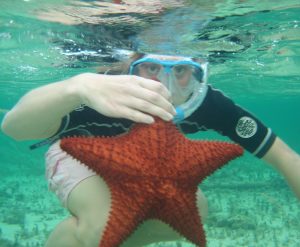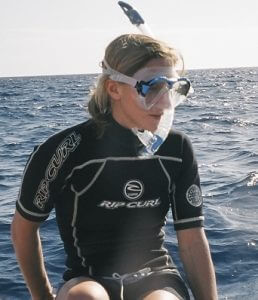B.S., Biology with a concentration in Marine and Environmental Biology
Currently Works for the Environmental Protection Agency
I have always loved the ocean. I grew up in Long Branch, surfing The Pit and Phillips Ave, working at the Takanassee Beach Club, and hanging out at the Windmill. My fascination with the ocean led me to pursue a B.S. degree in Biology with a concentration in Marine and Environmental Science at Monmouth University. The School of Science faculty and staff were instrumental in transforming my love of the ocean and science into a fulfilling career.

The MU faculty and staff opened my eyes and mind to the sea of opportunities available in the marine science arena — opportunities to positively affect the environment. Dr. Kathryn Lionetti’s enthusiasm for microbiology was contagious. With each lecture, I found myself more and more enamored with these tiny little creatures and amazed by the impact these microbes could have on our
bodies and the environment. Dr. Michael Palladino’s genetics course and molecular lab introduced me to the rapidly developing world of molecular biology. As his student, I remember learning about molecular tools like microarray and gene sequencing methods that I never in a million years thought would be such an integral part of my regular routine as a scientist.

During my senior year at MU, guided by then-Associate Dean John Tiedemann, I participated in the Tropical Island Ecology course at the Cape Eleuthera Institute, Eleuthera, Bahamas. We conducted research focused on addressing important issues such as overfishing and habitat degradation facing the wider Caribbean region while balancing the needs and culture of the Bahamian communities dependent on these ecosystems. This opportunity turned out to be a pivotal experience that allowed me to realize my desire to pursue a career where I could use science to ensure a healthy future for our oceans, coasts, and communities.
Following graduation, I began work at MU’s Urban Coast Institute (UCI) where we collaborated on a number of projects that used science to inform policymakers and the public on issues facing coastal systems. I then pursued a Ph.D. degree in Marine Science from William and Mary, Virginia Institute of Marine Science under the guidance of Dr. Bongkeun Song. My dissertation research employed molecular and biogeochemical techniques to elucidate interactions that occur within nitrogen cycling microbial communities and better understand the role of microorganisms in maintaining
healthy coastal environments. In April 2015, I defended my dissertation Linking Structure and Function of Microbial Communities Responsible for Sedimentary Nitrogen Processes in
North Carolina Estuaries.
After obtaining my Ph.D., I accepted a position with the EPA in Pensacola, FL, where I am currently involved in a number of research tasks that aim to identify microbial indicators of water quality and assess how an ecosystem responds and recovers from stressors such as high nutrients or low oxygen. I am extremely fortunate that my career path has allowed me to continue conducting research to promote healthy coastal systems for the well-being of humans, the same type of fulfilling research that I started as an undergraduate student at MU.

